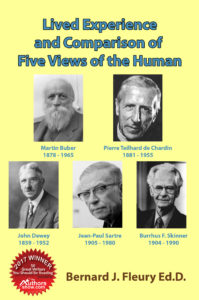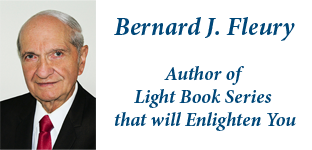
ISBN: 1544762232
Article 1: Know that evolution is a purpose driven process with the human phenomenon with its unique reflective human consciousness is at its very core. What if evolution is the ascent to consciousness, with man, the human, with the most highly developed consciousness as the leading shoot of consciousness?
Article 2: Know that man, an existent who is most human when engaging in the I-Thou relationship with his creator and fellow persons. What if for married persons, the principle I-Thou relationship should be with each other? What if the principle I-Thou relationship for each person is with God-a relationship mirrored in the I-Thou relationship of married persons?
Article 3: Know that man, is simply a collection of innate impulses to act. What if “learn to do by doing” is the way to develop our children’s “innate impulses to act” from being random and inchoate, to having a definite structure through interaction with a carefully planned classroom environment?
Article 4: Know that man, the primary existent, who determines his own essence by the choices he makes. He is a god unto himself. What if I, a unique individual self, am the basic reality, the “prime existent”? What if I possess internal freedom-am not determined (programmed) but can be influenced by my environment if I choose to be? What if there is no predefined human nature, no single concept of man because there is no God to define man and “nothing”, my origin, doesn’t define me? What if the basis of choice is my own freedom? What if I, a man, am “condemned to be free”-even though I did not create myself, I am responsible for all that follows once I exist? What if whether or not God exists is irrelevant because even if He does exist He would play a part in my life only if I choose to believe in Him, and choose to let Him play a part in my life? What if life is absurd because there is no empirical justification for man’s existence, no “reason” for living, except the reasons each man chooses for his own life?
Article 5: Know that man is a reactive organism whose behavior is shaped and maintained by the consequences of a selective environment. What if man the human was and is nothing more than a purely natural creature like the rat and pigeon except that man has a much more highly complex brain and nervous system?
Article 6: Know that Buber’s and de Chardin’s views of man, the human, are the two theistic views among the five views of man I present in my revised book in answer to the question what is man? What if both Buber and de Chardin believe that the Other-Than-Us a transcendent god, is the starting point in their view of man, the human? What if de Chardin and Buber believe that man, the human is a person, and that Person is at the heart of the universe because the Other-Than-Us, God, is a person (three persons for de Chardin)? What if de Chardin and Buber would agree that their theory (view) of man is based on the synthesis of philosophy, science, and religion?
Article 7: Know that John Dewey’s view of man is one of the atheistic views of the three atheistic views (J.P. Sartre and B.F. Skinner) of man that I present in my revised book in answer to the question what is man. What if Dewey believes that “in truth experience knows no division between human concerns and a purely mechanical physical world.” Man’s home is nature: his purposes and aim are dependent for execution upon natural conditions”? What if Buber and de Chardin absolutely disagree with Dewey? They believe that man is a body-mind-spirit complex made in the image and likeness of God and destined for final union with Him.
Article 8: Know that Sartre, Buber, and de Chardin agree that I (each man) am a unique individual self. What if according to Buber and de Chardin, I am not the basic reality, the prime existent? What if according to Buber and de Chardin, “nothing” is not my origin? My parents and God are my origin. What if I possess internal freedom, am not determined or programmed, but prior to the age of reason my environment can imprint me for life? What if there is a definite human nature predefined by God and the child’s parents? What if the basis for choice is my own freedom but my choice needs to be based on an “informed conscience”? What if de Chardin, Sartre, and Buber agree that we are “free” whether we like it or not?
Article 9: Know that Skinner believed the basic substance of the universe is physical matter, which takes many forms. What if Buber and de Chardin would absolutely disagree? What if Skinner defines man as a biological organism who needs to be studied through a science of human behavior so that the behavior of man can be controlled and the human condition improved? What if Buber and de Chardins’ views are compatible with man being a biological organism in part but that is only the “without” of him and omits the “within” which is the source of all the components that Skinner lists under autonomous man?
I wrote this e-Book to describe my actual lived experience of the five philosophers’ views in my own life and career as a teacher, principal, and college professor.
How much these views affect each person who reads this e-Book will differ accordingly to the person’s personality and career.
Buy Now on Amazon